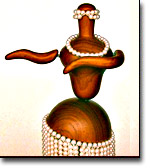| |
|
MASTHEAD: Michael Neff Managing Editor Lorena Knight Poetry Editor Diana Adams International Fiction Editor Madhushree Ghosh Contributing Editors: Ken Atchity Peter Conners Walt Cummins Peter Johnson Dan Kaplan Tom Kennedy Robert Hill Long Gary Lutz Richard Zimler The goal of Del Sol Review is to publish the best work available. Political motives do not compromise, and we do not publish inferior work simply because a "name" tag comes attached. - Michael Neff
 Del Sol Review Published by Web del Sol 2020 Pennsylvania Avenue, NW Suite 443 Washington, DC 20006 | CONTACT |
 Spring 2011, #17 Spring 2011, #17"INTERNATIONAL TYPES OF TALE PLUS ARCHIVE POEMS"  HOME PAGE HOME PAGE
from Obtuse Diary by Amelia Rosselli translated by Linda Lappin She left without telling anyone why she was leaving: she left obedient to the others in going, they wanted her to go. She left and it was like slipping off a jacket, so busy with leaving , and thinking : why did I leave? why did they make me leave? I don't know why I left, she thought, and I don't even want to know why they wanted me to leave, she thought, and now I don't even want to leave, she thought. Sitting on the dead seat, she made a smooth, tiring journey, always thinking to herself: why leave? Why did they want me to leave? It came to mind: why did she castrate herself? Because she was alone and undesirable? Because she was conscious of her decision? Or because she was new to the grind? It was as if a beast of questions had struck her in the right spot: her head, her navel - knowing all - knowing nothing: preferring herself dead. She got on the train and made her trip and obtained from the conductor the promise that she would arrive in time to be destroyed by the new place, where, finally, she would learn to live. Wanting keenly to know how to live and to get from life only what was owing to her. But nothing was owing to her and with horror she realized this after a few months in the new city which from the outset seemed very sad and useless. She urgently followed her own intentions and obeyed the intentions of others: she worked till she was too exhausted to follow her own instructions. Without instructions, she discovered she did exist, but she insisted on recognizing only the instructions of others, in full obedience, in the pride of humiliation, in the mathematic simplicity of calculating her present duties forgetting past tortures never understood. She didn't think about dying, or of dying of it, or having to accept the mercy of others: rather so hard and simple and pure was her determination that it almost destroyed her, for she did not admit that this lottery of her person, listed among useless objects, could be so hard, dangerous, inhuman.
Now the knowledge, or a glimmer, or a crumb of knowledge here and there
reawakened her and made her realize a few things at least, with vehemence,
violence, disappointment, and finally joy in understanding. She realized that
damage had been done to her; that her horror for the crimes of others was
to be considered with indifference, so that she could reach higher goals of
the spirit, of volatile art and religion: her hunger for God
satisfied for an instant : she even lifted off the earth's surface, floating,
and asked for more peace, more tenderness, forgiveness for
herself and for men without knowing anything about men, but understanding too
well their calculation and cruelty. She spoke not a word of her most
 HOME PAGE HOME PAGE
|



